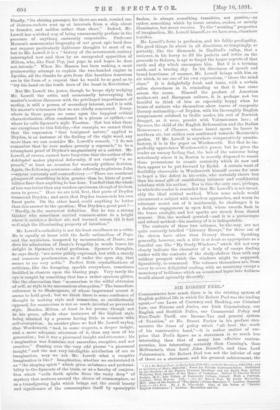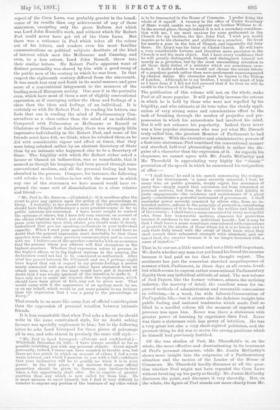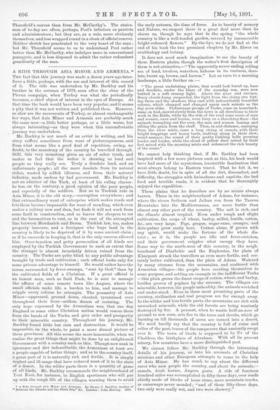SIR ROBERT PEEL.*
CONSIDERING, bow much there is in the existing system of English political life in which Sir Robert Peel was the leading agent,—" our Laws of Currency and Banking, our Criminal Law, our Prisons and Juries, our Irish Constabulary, our English and Scottish Police, our Commercial Policy and Free-Trade Tariff, our Income-Tax and general system of Taxation," as Mr. Stuart Parker in his preface enu- merates the items of policy which "all bear the mark of his constructive hand,"—it is rather matter of sur- prise that Peel's figure as a statesman is so much less interesting than that of many less effective contem- poraries, less interesting certainly than Canning's, than Melbourne's, than Lord John Russell's, and than Lord Palmerston's. Sir Robert Peel was not the inferior of any of these as a statesman, and his greatest achievement, the • (1.) Sir Robert Pool ; in Early Life,1788-1812 ; as Irish Socrotary,18124818; and as Secretary of Stat., 182 .1821. from his Private Correspondence. Published by the Trustees of his Papers, Viscount Hardinge and the Right Hon. Arthur Wellesley Peel, Speaker of the Honso of Commons. Edited by Charles Stuart Parker, M.P., late Fellow of University College, Oxford. With a Portrait. London; John Murray P91.—(2.) Sir Robert Pool. By Justin McCarthy, M.P. (One of the Series of "The Queen's Prime Ministers."1 London ; Sampson Low.—(3.) Pod. By J. R. Tbursfield. (Ono of the Series of "Twelve English btatesmen,") London ; Macmillan and Co. repeal of the Corn Laws, was probably greater in the benefi- cence of its results than any achievement of any of those statesmen, excepting only the great Reform Aet which was Lord John Russell's work, and without which Sir Robert Peel could never have got rid of the Corn Laws. But there was a reticence in Peel which takes all the colour out of his letters, and renders even his most familiar communications on political subjects destitute of the kind of interest which men like Melbourne and Canning, and even, to a less extent, Lord John Russell, threw into their similar letters, Sir Robert Peel's apparent want of distinct personality was shared by hint with a good many of the public men of the century in which he was born. In that respect the eighteenth century differed from the nineteenth. It was much less easy and frank in its social manner, and gave more of a conventional integument to the manners of the leading men of European society. One sees it in the portraits even, which have most of them a sort of slightly conventional expression, as if conveying rather the ideas and feelings of a class than the ideas and feelings of an individual. It is certainly so with Sir Robert Peel. In reading his letters, one feels that one is reading the mind of Parliamentary Con- servatives as a class rather than the mind of an individual. Compared with Palmerston or Melbourne or Russell or Gladstone or Disraeli or Salisbury, there was strangely little impressive individuality in Sir Robert Peel, and some of his friends must have felt, we think, when he rebuked them, as he did with considerable vigour and effect at times, that they were being rebuked rather by an abstract Secretary of State than by an intimate who happened also to be a Secretary of State. The frigidity with which Sir Robert either asked a favour or blamed an indiscretion, was so remarkable, that it seemed as though his language had been passed through some conventional medium, and all the personal feeling had been absorbed in the process. Compare, for instance, the following cold rebuke to his brother-in-law with the manner in which any one of the statesmen we have named would have ex- pressed the same sort of dissatisfaction to a close relative and friend :— " Mr. Peel to Mr. Dawson.—(Undated.)—It is needless after the event to give any opinion upon the policy of the proceedings at Derry. I certainly, in the present state of the Catholic question, should have thought forbearance a more prudent course so far as public interests are concerned. I have never sought to control the opinions of others, but I have felt very anxious, on account of the official relation in which you stand to me, that when you ex- press your opinions upon Irish affairs, you should make it clearly understood that you are speaking exclusively in your individual capacity. When I read your speeches at Derry, I could have no doubt that the general impression must inevitably bo that those speeches were made after previous communication and in concert with me. I believe one of the speeches concludesWith an assurance that the persons whom you address will find champions in the highest quarters. Whether that expression refers to persons in the highest offices, or in the highest stations in the country, the declaration could not fail to be considered as authorised. After what has passed between Mr. O'Connell and me, I perhaps might have hoped that out of regard to my private feelings a person nearly connected with 1110 would either have abstained from an attack upon him, or at the least would have put it beyond all doubt that I was wholly ignorant of the intention to make it. I have only now to make one request, that the explanation, which should have been given at first, may not be given now. That would carry with it the appearance of an apology made by me, or on my behalf, which would be yet more painful to my feelings than the impression that I was a party to the proceedings at Derry,"
That sounds to us more like some feat of official ventriloquism than the expression of personal vexation between intimate friends.
It is less remarkable that when Peel asks a favour he should write in the same constrained style, for no doubt asking favours was specially unpleasant to him ; but in the following letter he asks Lord Liverpool for three pieces of patronage all in one, and asks almost in precisely the same stiff style :- " Mr. Peel to Lord Liverpool.—(Private and confidential.)— Whitehall, December 24, 1825.—I have always avoided as far as possible troubling you with any personal objects. About myself personally, indeed, I never can have occasion to trouble you, but there are two points in which on account of others I feel a very warm interest, and which I mention to you with a full confidence that your inclination will be to gratify me when it is in your power. In the first place, I am desirous that some official promotion should be given to Dawson (my brother-in-law) when a fair opportunity shall offer. Ile is capable of greater exertion than any which is now called for from him. lie is most anxious to exert himself, but I find it very difficult to transfer to anyone any portion of the business of my office which is to be transacted in the House of Commons. I prefer doing the• whole of it myself. A vacancy in the office of Under Secretary of State would enable me to appoint my brother William to it. lathe second place, though indeed it is not a secondary considera- tion with me, I am most anxious for some preferment in the Church for my brother, the Rev. John Peel, I wish you would. inquire as to his character and abilities as a preacher. He lived for nearly a year in the Isle of Thanet, and repeatedly did duty. there. Dr. Lloyd was his tutor at Christ Church. He will have- a very considerable fortune, and therefore mere provision in the Church is not the main object. But I have every confidence that he will greatly distinguish himself, and distinguish himself not merely as a preacher, but by the most unremitting attention to• all those daily duties of a minister which are sometimes over- looked. I doubt whether he would not choose the severe labour. of a populous parish rather than mere preferment unaccompanied. by clerical duties. His character must be known to the Bishop. of London. Although he is my brother, I would not speak of him. as I have done if I did not feel assured that if he lives he will do. credit to the Church of England."
The publication of this volume will not, on the whole, make• Peel at all more popular. It will probably increase the esteem in which he is held by those who were not repelled by his, frigidity, and who estimate at its true value the steady appli- cation of very strong sense and conscientious effort to the task of breaking through the meshes of prejudice and pre- possession in which his antecedents had involved his mind. But it will not enhance his popularity. Indeed, there never
was a less popular statesman who was yet what Mr. Disraeli- truly called him, the greatest Member of Parliament he had ever known. With the executive and administrative powers or a first-rate statesman, Peel combined the conventional manner. and starched, half-real phraseology which is rather the dis- guise of a character than the expression of it. As regards his eloquence, we cannot agree with Mr. Justin McCarthy and Mr. Thursfield in appreciating very highly the " classic "' peroration of the speech in which he announced his resignation of office :- "' shall leave,' ho said in his speech announcing the resigna- tion of his Government, 'a name severely censured, I fear, by many who, on public grounds, deeply regret the severance of party ties—deeply regret that severance, not from interested or personal motives, but from the firm conviction that fidelity to party engagements—the existence and maintenance of a great party—constitutes a powerful instrument of government. I shall surrender power severely censured by others who, from no in- terested motive, adhere to the principle of protection, considering the maintenance of it to be essential to the welfare and interests. of the country ; I shall leave a name execrated by every monopolist who, from less honourable motives, clamours for protection because it conduces to his own individual benefit ; but it may be that I shall leave a name sometimes remembered with expressions of goodwill in the abodes of those whose lot it is to labour and to earn their daily bread with the sweat of their brow, when they shall recruit their exhausted strength with abundant and un- taxed food, the sweeter because it is no longer leavened with a sense of injustice.'" That is, to our ear, a little unreal and not a little self-important. We doubt whether any man ever yet found his bread the sweeter because it had paid no tax that he thought unjust. The sentiment has just the somewhat starched magniloquence of manner which Parliament, in those days at all events, loved,. but which seems to express rather conventional Parliamentary dignity than any individual attitude of mind. The new volume
of Peel Papers, like the former volumes, attests the untiring industry, the mastery of detail, the excellent sense for im- proved methods of administration and reasonable concessions to criticism,—in a word, the wide Liberal-Conservatism of Peel's public life,—but it attests also the deficient insight into-
public feeling and national tendencies which made Peel BO blind to a needful reform till the moment of urgency and pressure was upon him. Never was there a statesman with greater power of learning by experience than Peel. Never was there a statesman with less power of intuition. He was a very great but also a very short-sighted politician, and the greatest thing he did was to storm the strong positions which. he himself hail previously fortified.
Of the two studies of Peel, Mr. Thursfield's is, on the• whole, the more effective and discriminating in its treatment of Peel's personal character, while Mr. Justin McCarthy's. shows more insight into the exigencies of a Parliamentary situation and the tactics of the Leader of the House of Commons. Mr. Thurefield hardly discusses at all the ques- tion whether Peel might not have repealed the Corn Laws without breaking up his party so fatally. Mr. Justin McCarthy discusses the point, and discusses it very shrewdly. But, on the whole, the figure of Peel stands out more clearly from Mr. Thursfield's canvas than from Mr. McCarthy's. The states- men of to-day are often, perhaps, Peel's inferiors as patriots and administrators ; but they are, as a rule, more obviously themselves, and less wrapped round in a cloak of official reserve. Neither sketch has penetrated to the very heart of the man ; but Mr. Thursfield seems to us to understand Peel rather better than Mr. McCarthy, who indulges more in conventional panegyric, and is less disposed to admit the rather redundant grandiosity of the man.




































 Previous page
Previous page